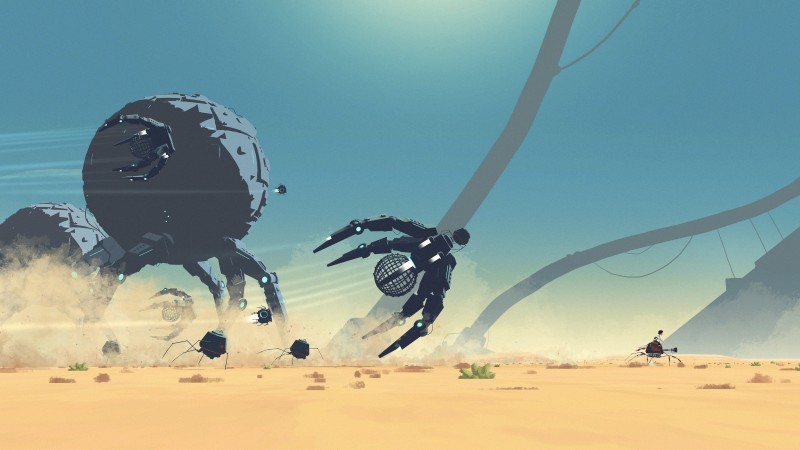Since the release of Limbo in 2010, cinematic puzzle platformers have relied on capturing players’ attention and imagination with beautiful art direction and compelling, often cryptic storytelling. As typically succinct experiences, moment-to-moment puzzles should hit hard with clever, memorable obstacles and not stray from repeating familiar mechanics over and over again. Lana’s Planet almost hits this sweet spot, boasting a gorgeous presentation, but trekking through this strange world doesn’t always inspire the same awe.
Lana’s Planet wastes little time throwing players into the fire. As young Lana, your small village, including someone close to you, has been abducted by alien machines. It’s up to you to find and free them all, and you’re joined by an adorable (and pet) cat-like companion named Mui. It is a treat to watch the tender and sad moments between the pair as everything looks great. From picturesque meadows to postcard-worthy beach views, there are many snapshots worthy of being framed as pieces of art. The majestic soundtrack sits high on my best of the year list, with the main theme, in particular, becoming a welcome earworm that also has interesting narrative significance.
The game offers a sufficiently engrossing story, and it’s hard not to smile at Lana and Mui’s cute, though limited, interactions. More exciting world-building happens along the edges, mainly through collectible, easy-to-miss pieces of an illuminated wall carving. Is it earth or some other planet? What are machines, and where did they come from? Lana’s Planet leaves some answers ambiguous, but the intrigue helped me move forward, even though I’m still drawing my own conclusions.
Lana’s deliberate, momentum-based movement feels fine but occasionally causes headaches, like watching her slide sideways after taking a big jump. Problem-solving involves the sometimes difficult task of moving objects into their correct positions and placing things in the proper order so that both characters can bypass obstacles. Mui’s superior agility means you’ll command them to knock down climbing ropes, activate distant switches, or lure enemies to fetch Lana. I just wish Muay didn’t stop after taking action, so I wouldn’t have to keep calling him to my side. Eventually, Mui and Lana can hijack animal brains or hack machines, respectively, to make them serve as platforms or weights for pressure-sensitive switches. These are great abilities I wish the game used more often.
There are some clever ideas in these traversal puzzles, but they don’t develop much or quite get to the next gear. You push objects, climb ropes, and duck into tall grass to avoid patrolling machines for the bulk of the journey, albeit in a more elaborate way. A few less recurring exercises break this routine, such as manipulating the water level in lakes, but none of the ones I tackled really impressed me, and I occasionally groaned when the puzzles returned to status quo. . I solved some obstacles at first glance, and others can be frustratingly simple even in the game. The puzzle-solving may be moderate, but Planet of Lana has a sprinkling of adrenaline-pumping moments. I got a chance to kick off a quick-time-event-driven race in the desert while your mount races through an armada of giant marching machines.
While I would have liked the gameplay to have more bite and variety, Planet of Lana is still an enjoyable and beautiful romp. The art direction and main jingle are possibly the only things that will stick with me in the long run, but Lana and Mui’s journey is a competent rescue mission that doesn’t always go as far as the machines chasing them.
